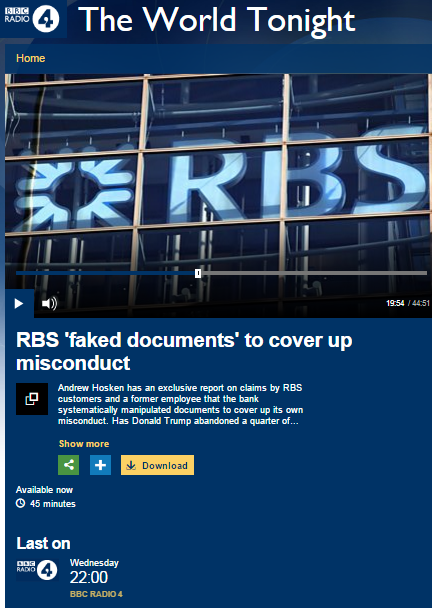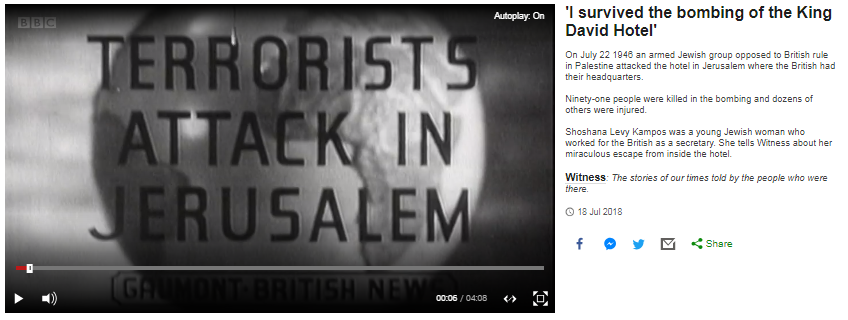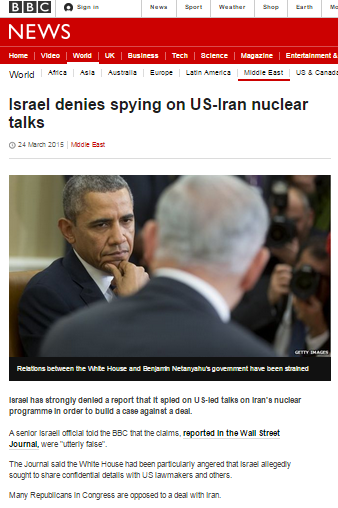BBC Radio 4’s series ‘Our Man in the Middle East’ continued on June 16th with episode 15 – titled “Missiles and the Ballot Box” – which was devoted to Jeremy Bowen’s view of the Gaza Strip.
“Jeremy Bowen explores Gaza, the Palestinian territory controlled by Hamas, the Islamic resistance movement. It’s not a place you would chose [sic] for a Mediterranean holiday, though the Palestinians used to dream of developing a tourist industry, he says. “Israel could recapture Gaza in days if it wanted to. But then it would be responsible for around a million children and about the same number of angry adults. Palestinians can’t destroy a state as strong as Israel. But Israel can’t bludgeon Palestinians into submission either.””
Refraining from informing audiences that hopes of economic development in the Gaza Strip were killed off by, among other things, the Islamist take-over of the territory, Bowen opens the programme with the theme promoted in that synopsis. [emphasis in italics in the original]
“Gaza is not a place you’d choose for a Mediterranean holiday although the Palestinians used to dream of developing a tourist industry. The beaches are sandy and run for 25 miles along the Mediterranean from the top right-hand corner of Egypt. It’s no wider than 7 miles and, apart from the short Egyptian border, it’s entirely surrounded by Israel. Since 2006 [sic] the Palestinian group Hamas – the Islamic resistance movement has controlled it.”
Bowen then goes on to describe the Erez crossing – but without providing listeners with any explanation of why the stringent security measures he portrays in such detail are necessary. He continues:
“Palestinians often call Gaza the world’s biggest jail and it’s hard to argue. Many spend whole lives there without being able to leave. I’ve met thirty-something men who’ve never left.”
Bowen’s portrayal does not clarify to listeners that on average around a thousand people exit Gaza via the Erez crossing every day for medical treatment, commercial, academic or sporting activities or religious trips. He refrains from making any mention of the existence of the crossing into Egypt at Rafah, or why that crossing is so frequently closed by Egypt.
Bowen then gives some historical background but refrains from clarifying that the Gaza Strip was included in the territory allotted for the creation of a homeland for the Jewish people by the League of Nations.
“Gaza was one of the historic towns of Palestine; a small place surrounded by fields and sand dunes when it was captured by Egypt in Israel’s 1948 war of independence. Tens of thousands of Palestinian refugees fled there to escape the Israeli advance or because they were forced out of their homes at the point of a gun.”
The siege – and subsequent evacuation – of Kibbutz Kfar Darom in 1948 is of course not included in Bowen’s account. He goes on:
“Israel captured Gaza from Egypt in 1967 and finally pulled out its soldiers and settlers in 2005, though it still controls who goes in and out by land, sea and air.”
Bowen makes no mention of the fact that agreements on movement and access from and to Gaza were signed by Israel and the Palestinian Authority after Israel’s disengagement from the Gaza strip in 2005. Failing to clarify to listeners why residents of a territory that has been under PA and then Hamas rule for the last twelve years are still classified as refugees or why refugee status is inherited, Bowen goes on:
“These days almost two million people live in the Gaza Strip. About two-thirds of them are descendants of the original refugees. Refugee children are taught at schools run by the UN. Their future is bleak. The UN predicts that Gaza might become uninhabitable by 2020 if there’s no end to the conflict with Israel.”
Ignoring the fact that Egypt saw fit to adopt similar counter-terrorism measures to those introduced by Israel after the violent Hamas coup in 2007 and failing to mention the rise in terrorism that was the cause of those measures, Bowen continues:
“Israel put Gaza under a severe blockade in 2007 after Hamas took over. To overcome it, Palestinians built a network of smuggling tunnels into Egypt. […] For years after Hamas took over Gaza and the Israeli blockade bit hard, almost everything except the most basic commodities was smuggled in from Egypt through the tunnels.”
In fact, smuggling tunnels existed in the Rafah area long before 2007. Bowen’s portrayal of that issue does not include any information concerning the taxes and tariffs levied by Hamas on smuggled goods. Ignoring Egyptian actions against the tunnels, Bowen tells listeners that:
“Israel used to bomb the tunnels to uphold their blockade and because weapons were also smuggled through them. The blockade, the bombing and Israeli fears about Hamas weaponry all ramped up the tension.”
Having told listeners that the Hamas-Fatah split is rooted in “the death of Yasser Arafat”, Bowen goes on to refer to the Hamas Charter in the past tense.
“Hamas had a charter calling for its [Israel’s] destruction and was designated by Israel and the West as a terrorist group. The crunch came after Hamas unexpectedly won the elections in 2006. The Americans, proselytising hard for democracy, had pushed for the vote. But it didn’t produce the result they wanted. A few months later I was in the office of one of the top diplomats at the State Department in Washington DC. He sat back in his chair. ‘Of course’ he said ‘ it’s the wrong result. We’re going to have to overturn it’. The Americans gave full backing to Israel’s policy of isolating Gaza to put pressure on Hamas.”
Once again, Hamas terrorism is absent from Bowen’s tale. After a long account of his personal recollections of pre-Hamas coup inter-factional fighting in Gaza and a conversation with Mohammad Dahlan, Bowen tells listeners:
“After I left Gaza that time the feud between Fatah and Hamas became a mini civil war. Hamas won and Fatah officials including Dahlan rushed to the Israeli checkpoints to escape with their lives.”
According to reports from the time, Dahlan was not in the Gaza Strip during those days in June 2007: he had been abroad for several weeks for medical treatment.
Listeners hear a brief reference to missile attacks against Israelis without the groups that execute the attacks being named and without mention of any of the victims of such attacks.
“Living either side of the border wire – in Gaza or Israel – can be difficult and dangerous. Going through even one rocket attack on the Israeli side, let alone dozens in a day, is terrifying – as I found out.”
However, Bowen soon returns to form:
“When the wars flare up more Palestinians are killed than Israelis, including many more civilians.”
Bowen then revisits a report he produced in 2009 concerning Dr. Izzeldin Abuelaish.
“An Israeli tank had shelled his home and killed three of his daughters.”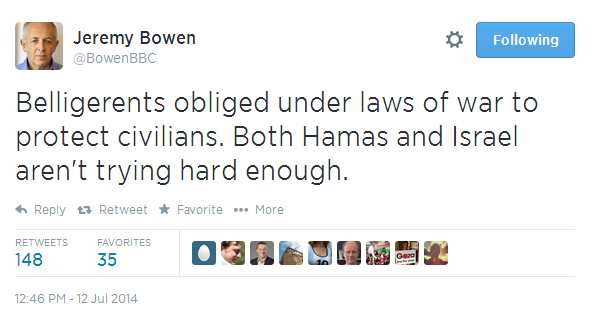
Bowen fails to tell listeners of the background to that the tragic incident but goes on to promote one of his usual pseudo-legal misinterpretations of the Law of Armed Combat and the term ‘disproportionate‘.
“The laws of war say belligerents shouldn’t use disproportionate force. Israel always denies doing so when it attacks Gaza but the evidence suggests that it does. The Israelis claim to take great care not to kill civilians but they use heavy weapons in densely populated areas, making civilian casualties certain.”
Bowen then revisits another of his previously promoted claims concerning Hamas’ use of human shields, while steering listeners towards an incomplete understanding of that term.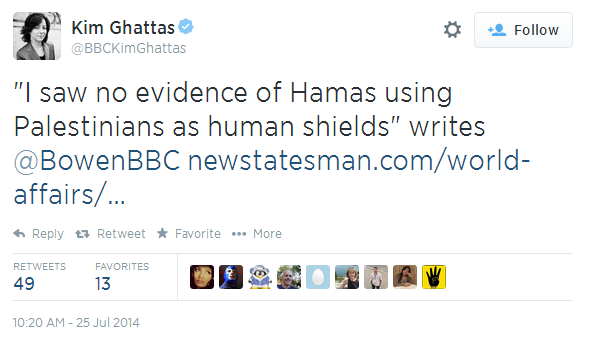
“I’ve never seen any evidence of Hamas forcing civilians in Gaza to stay in the firing line. But Israelis repeat time and again that Hamas hides behind human shields.”
The programme closes with Bowen opining that the terror organisation whose activities and abuses he has downplayed throughout the whole report should be party to negotiations.
“Until matters change in Gaza there will be more wars between Hamas and Israel. Change means a new attempt at peace with the participation and consent of all sides. Right now, there is no chance of that happening.”
Perhaps one of the more disturbing points emerging from this series of programmes by the BBC’s Middle East editor is the fact that the passage of time has done nothing to alter his opinions and analysis.
Having publicly claimed that he did not come across human shields in the few days he was in Gaza in the summer of 2014, three years later he cannot accommodate the ample evidence that shows otherwise. Having promoted his own pseudo-legal interpretations of the Law of Armed Combat in his 2014 reporting from Gaza, he is incapable of subsequently adjusting that view in line with the facts.
That, of course, is what happens when the agenda takes precedence over the actual story.
Related Articles:
BBC’s Bowen saw no human shields in Gaza – but reports them in Mosul
Law of Armed Conflict, Gaza and the BBC
Hamas PR department invokes BBC’s Bowen

